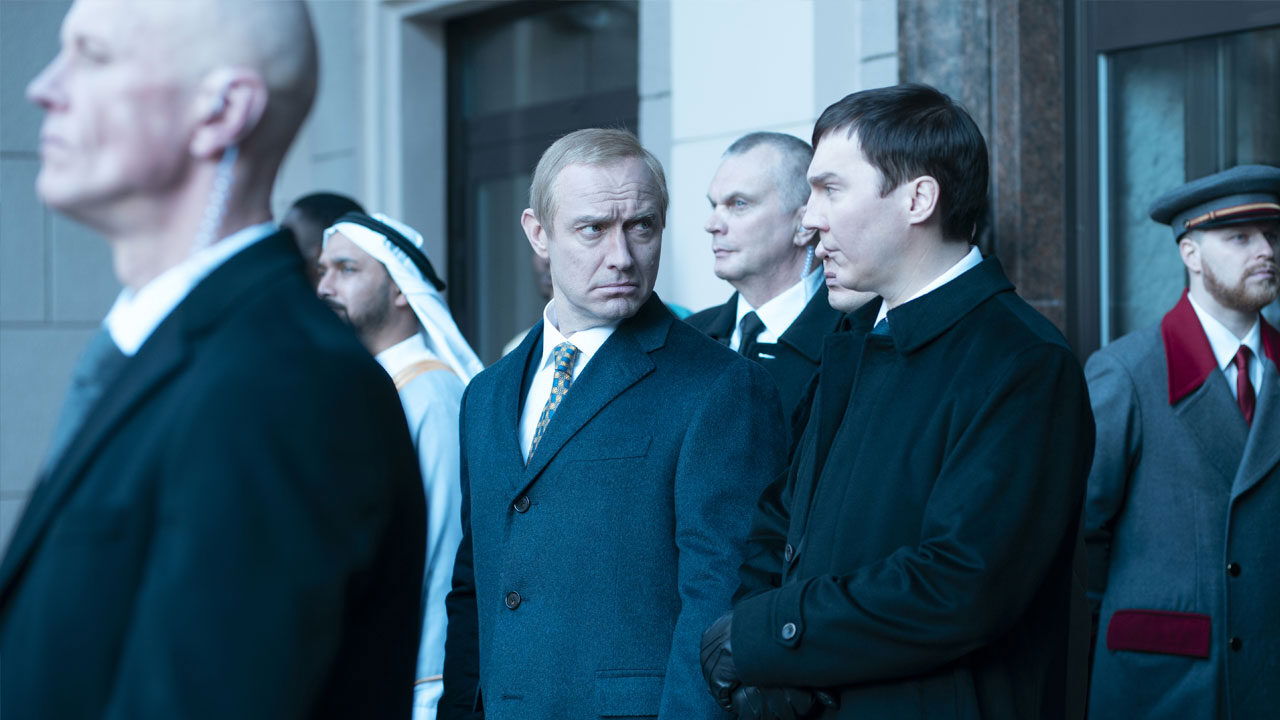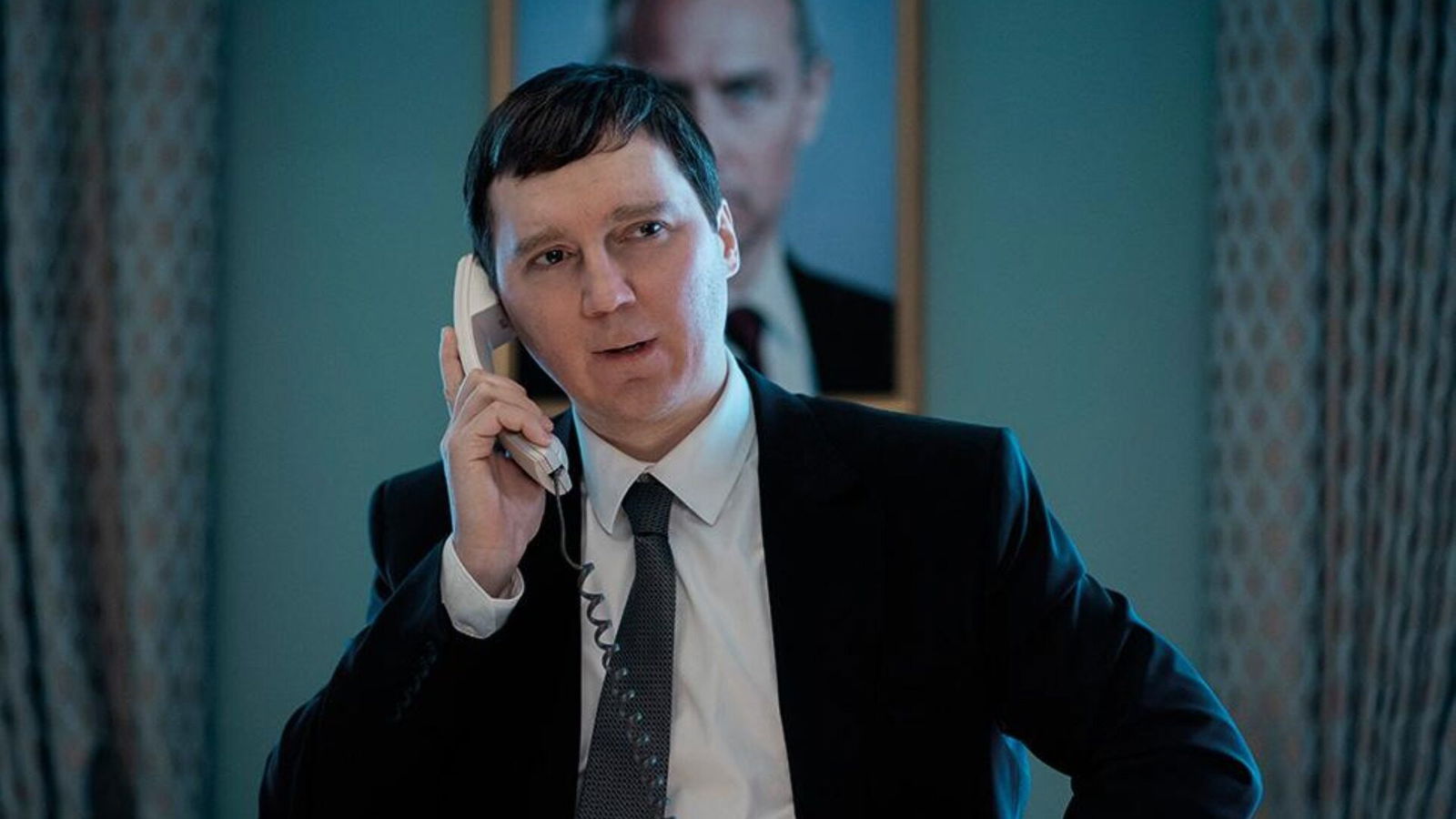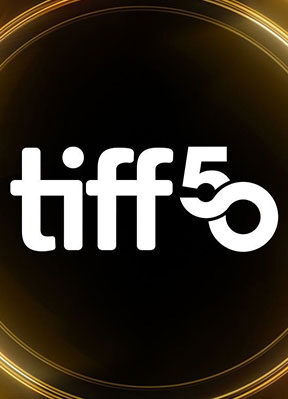Olivier Assayas has built a career examining morally ambiguous figures within complex political landscapes. From Carlos the Jackal to the Cuban Five, the French filmmaker has a knack for finding humanity in controversial subjects. With this in mind, I walked into his latest effort, The Wizard of the Kremlin, with high expectations. I was eager to see how his film, which attempts to chronicle Vladimir Putin’s rise to power through the eyes of fictional spin doctor Vadim Baranov, would unfold. Unfortunately, the ambitious scope overwhelms both the narrative and its audience, resulting in a film that feels dense, dull, and lacking a clear message.
Based on Giuliano da Empoli’s bestselling novel, the film follows Baranov (Paul Dano) as he transforms from an avant-garde theatre director in the post-Soviet 1990s into the architect of Putin’s political image. Speaking to American journalist Rowland (Jeffrey Wright) years later, Baranov reflects on his role in shaping modern Russia, offering viewers a glimpse into the chaotic era when democracy briefly took root before authoritarianism reasserted itself. It is a strong concept with the potential to probe one of the most terrifying regimes in modern history, but the film stumbles and falls short.
In truth, The Wizard of the Kremlin opens strongly, delivering a promising first act that gave me hope for what was to come. Dano offers a controlled and powerful performance as the soft-spoken Baranov, whose cherubic appearance masks considerable political cunning and complexity. His evolution from idealistic artist to pragmatic kingmaker provides the narrative backbone, while Wright serves as an effective framing device for the broader story. The early scenes depicting Russia’s wild capitalist experiment in the 1990s capture the era’s sense of possibility and chaos, complete with oligarchs hosting extravagant parties while ordinary citizens struggled with poverty.
The Wizard of the Kremlin works best when setting the stage for the era its characters inhabit, laying the groundwork for what comes later in the film. I connected with Dano’s Baranov, understanding his idealism and drive to create new and exciting things. I was even willing to follow as he slowly rose through the ranks and carved a place for himself in the new Russia that emerged from the chaos. But somewhere along the way, the film lost me. It became a dreary slog, glossing over major, world-changing events without giving weight to any of them.
There had been talk about Jude Law‘s portrayal of Putin in the lead-up to the screening, but his performance felt inconsistent across the film’s lengthy runtime. At times, it resembled a Saturday Night Live character more than a portrayal of a historical figure. Law captures Putin’s mannerisms and adopts a harsh accent that occasionally feels forced, yet he does convey the quiet menace that would later define the Russian leader’s public persona.

The film wisely avoids outright caricature, presenting Putin as a mild-mannered figure whose true nature emerges gradually through calculated political moves. Even so, the character lacks depth. He is introduced as a bureaucrat, and throughout the film, that remains his primary dimension, even as he pursues ruthless goals that claim countless lives.
At 156 minutes, The Wizard of the Kremlin tries to cover decades of Russian history while also exploring Baranov’s personal relationships, particularly his turbulent romance with the glamorous Ksenia (Alicia Vikander). The result never feels cohesive or consistent. The film plays more like a miniseries with the most interesting material cut out, robbing the story of dramatic weight. Key historical moments such as the Chechen War, the Moscow apartment bombings and the annexation of Crimea receive only cursory attention, treated more as footnotes than as defining events.
These problems are compounded by the film’s uneven narrative structure, which divides the story into chapters and relies heavily on voice-over narration instead of dramatic action. As a result, the film often feels like a political theory lecture disguised as entertainment, lacking the depth needed to make its ideas resonate. While Dano’s narration carries a weary, pragmatic tone that renders Baranov both charming and dangerous, the approach distances viewers from the emotional stakes. Even as oligarchs are imprisoned and exiled, the consequences feel abstract rather than visceral. There is a wealth of material that could have been explored, but it is kept at arm’s length, preventing audiences from connecting beyond a surface level.
“Most damaging of all, The Wizard of the Kremlin never establishes clear stakes or consequences for its protagonist.”
The supporting cast struggles with underwritten roles, offering little emotional grounding. Alicia Vikander injects energy into Ksenia, but her character exists largely to generate romantic complications for Baranov rather than advance the political narrative. Even that subplot feels shallow, never probing why these two characters are drawn to each other or what sustains their bond. Tom Sturridge and Will Keen play oligarchs whose downfalls illustrate the risks of opposing Putin, yet their arcs feel incomplete, rushed through to make room for other plot threads. The result is a film that contains moments of promise but ultimately frustrates with wasted potential.
Most damaging of all, The Wizard of the Kremlin never establishes clear stakes or consequences for its protagonist. Despite Baranov’s central role in constructing Putin’s authoritarian regime, he remains emotionally opaque throughout. The audience is never invited to connect to his worldview or understand the motivations behind his choices. Instead, we are given monologues, long-winded exchanges and quiet moments of solitude that reveal little of his inner life. The shocking conclusion, though brutal in keeping with Russian political tradition, lands without impact because the characters’ inner truths remain unexplored.
The Wizard of the Kremlin offers fascinating insights into power, propaganda and political manipulation in post-Soviet Russia. Yet even with all the right elements in place, it never fully connects into something memorable. Assayas has assembled a talented cast and approaches the subject matter with intelligence and nuance, but the film fails to deliver on its promise. Its epic ambitions outstrip its execution. Instead of creating a compelling portrait of how democracy collapses, it presents an exhausting history lesson that never develops into the political thriller it aims to be. The result feels more like required reading than gripping cinema, and ultimately falls short on both counts.





